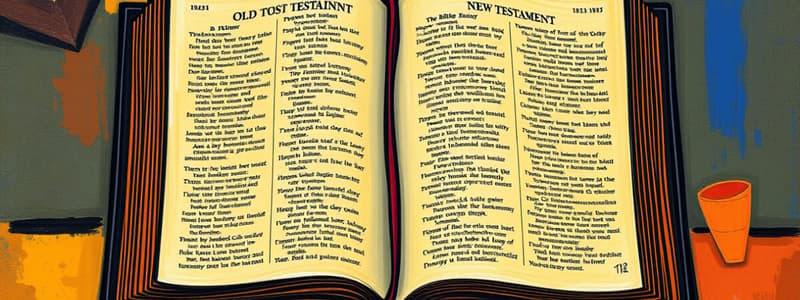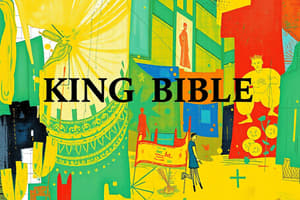Podcast
Questions and Answers
The Bible is made up of 66 books in total.
The Bible is made up of 66 books in total.
True (A)
The word 'Bible' means 'two books'.
The word 'Bible' means 'two books'.
True (A)
The New Testament contains 12 books.
The New Testament contains 12 books.
False (B)
The Apocrypha includes books that are part of the Bible canon.
The Apocrypha includes books that are part of the Bible canon.
There are 5 Major Prophets in the Old Testament.
There are 5 Major Prophets in the Old Testament.
The Gospels are the first five books of the New Testament.
The Gospels are the first five books of the New Testament.
There are 12 books categorized as Minor Prophets.
There are 12 books categorized as Minor Prophets.
The Old Testament contains more books than the New Testament.
The Old Testament contains more books than the New Testament.
The Bible canon is based on a Greek word meaning 'measuring stick'.
The Bible canon is based on a Greek word meaning 'measuring stick'.
The Books of Poetry in the Old Testament include Job, Psalms, and Ecclesiastes.
The Books of Poetry in the Old Testament include Job, Psalms, and Ecclesiastes.
Flashcards are hidden until you start studying
Study Notes
Overview of the King James Bible
- The term "Bible" originates from the Greek words "bi" (meaning two) and "ble" (meaning book), referring to two main sections.
- The Bible comprises 66 books: 39 in the Old Testament and 27 in the New Testament.
Bible Canon
- The Bible canon is the officially accepted collection of books that form the Holy Bible.
- The Greek word "kanōn" meaning "rule" or "measuring stick" reflects how the books are evaluated for inclusion.
- The canon consists of 66 significant texts; additional texts such as Tobit, Judith, and Maccabees are excluded and referred to as the Apocrypha.
Old Testament Categories
- Books of Law: 5 books (Genesis, Exodus, Leviticus, Numbers, Deuteronomy).
- Books of History: 12 books covering Israel's history (Joshua, Judges, Ruth, 1 Samuel, 2 Samuel, 1 Kings, 2 Kings, 1 Chronicles, 2 Chronicles, Ezra, Nehemiah, Esther).
- Books of Poetry: 5 books known for wisdom (Job, Psalms, Proverbs, Ecclesiastes, Songs of Solomon).
- Major Prophets: 5 books with significant prophetic content (Isaiah, Jeremiah, Lamentations, Ezekiel, Daniel).
- Minor Prophets: 12 shorter prophetic works (Hosea, Joel, Amos, Obadiah, Jonah, Micah, Nahum, Habakkuk, Zephaniah, Haggai, Zechariah, Malachi).
New Testament Categories
- Gospels: 4 accounts of Jesus’ life (Matthew, Mark, Luke, John).
- Historical Book: 1 book detailing early Church history (Acts).
- Pauline Epistles: 14 letters by Apostle Paul (Romans, 1 & 2 Corinthians, Galatians, Ephesians, Philippians, Colossians, 1 & 2 Thessalonians, 1 & 2 Timothy, Titus, Philemon, Hebrews).
- General Epistles: 7 letters written by other apostles (James, 1 & 2 Peter, 1, 2 & 3 John, Jude).
- Prophecy: 1 prophetic book (Revelation).
Significance
- The division of the Bible into categories serves to organize the texts based on genre and purpose, aiding in study and understanding of biblical themes and teachings.
Studying That Suits You
Use AI to generate personalized quizzes and flashcards to suit your learning preferences.


